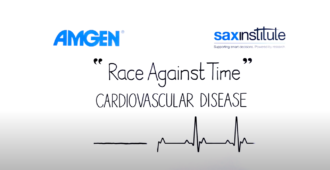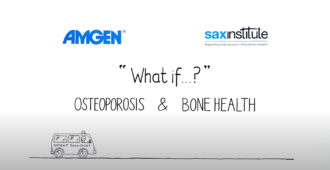Develop adaptable decision support tools
Decision Analytics
The Sax Institute uses dynamic simulation modelling to develop interactive, evidence-informed decision-support tools to assist policy makers and program planners to analyse complex problems.
Dynamic simulation models are powerful tools that can provide projections of alternative policy, operational and implementation strategies, before applying them in the real world.

What we do
Develop a systems level approach
Bring together stakeholder perspectives
Contextualise evidence
Build a case for investment
Test solutions
Identify research priorities
Our approach
Decision Analytics uses the latest advancements in system dynamics modelling, discrete event simulation and agent-based modelling to examine the most challenging and complex policy and planning issues. We work closely with our partners to understand the questions they have, and match the appropriate methodology to answer them.
Our decision-support tools are driven by policy priorities and are developed in close partnership with partners with experience and expertise from the beginning, to ensure they are robust and fit-for-purpose.
Our participatory approach helps to build a shared understanding among diverse stakeholders during the model development process and ensure that the models we deliver are transparent and relevant to real-world challenges, building trust in their outputs and insights.
Using this approach, our team distils evidence and data, and synthesises it with real-world knowledge to develop models that capture the complex and dynamic nature of our most challenging health and social problems.
We support our partners to interact with our models through user-friendly interfaces, staff training and supporting dissemination of findings to maximise their value and ensure that the model insights are incorporated into policy and practice.
Who we work with
We work in partnership with government departments, policy agencies, program planners, academic experts, non-government organisations, and community representatives across health and social sectors.
Frequently Asked Questions
Dynamic simulation models are simplified, computer-generated representations of complex systems which let us explore the way those systems behave and change over time. They give us a clearer understanding of how complex systems might behave under different conditions, and how various policies and initiatives can be used to optimise these systems.
The Sax Institute’s Decision Analytics team has experts in a range of modelling methodologies, including system dynamics modelling, discrete event simulation and agent-based modelling. Each can help you answer different types of policy and planning questions, ranging from why a system may behave in a problematic way to how we can solve this problem.
You can directly interact with our models to test the potential impacts of different policy or operational scenarios in a safe, virtual environment before making any changes in the real world. This helps you to understand the potential impact of changes to the system as a whole, lets you set and track targets, test scenarios and better allocate resources.
We create interactive and functional tools that support strategic and operational decision making across the health sector. We pair our computational models with a user-friendly interface that lets you interact with the model, tweak settings and test new scenarios and policy options.
Typically, we work closely with our partners and their stakeholders with a collaborative and hands-on approach to define the problem and develop a conceptual map of the system in which the problem exists. We then build the computational model and work with the stakeholder group to define and model a set of initiatives or scenarios to test. Finally, we develop a model interface or dashboard to let users interact with the model and support our partners to disseminate the model insights and generate a policy dialogue.
We work closely with you and your stakeholders to develop our models. This ensures that the model is fit-for-purpose, expert knowledge is integrated into the model, the model building process is transparent, everyone involved shares an understanding of the problem being modelled, and they have trust in the model and its outputs.
We work with policy agencies, non-profits and industry to deliver commissioned projects, and we partner with researchers on grant-funded research projects.
Our team will work with you from the start to understand how modelling can support your objectives and what type of modelling best suits your needs. We offer a highly bespoke service. No two projects are alike, so we encourage you to contact us to explore how we might work together. Email us at decision.analytics@saxinstitute.org.au.
Contact us
To begin working with us or to discuss how dynamic simulation modelling might support your work, please contact us at decision.analytics@saxinstitute.org.au
Examples of our work
- Strategies to reduce the burden of osteoporosis in Australia
- Strategies to reduce the burden of cardiovascular disease in Australia
- Partnering to develop a decision tool to reduce childhood overweight and obesity
- A what-if tool to address alcohol harms
- Strategies to reduce alcohol-related harms in Tasmania
- Modelling the effects of quitting smoking on COPD







